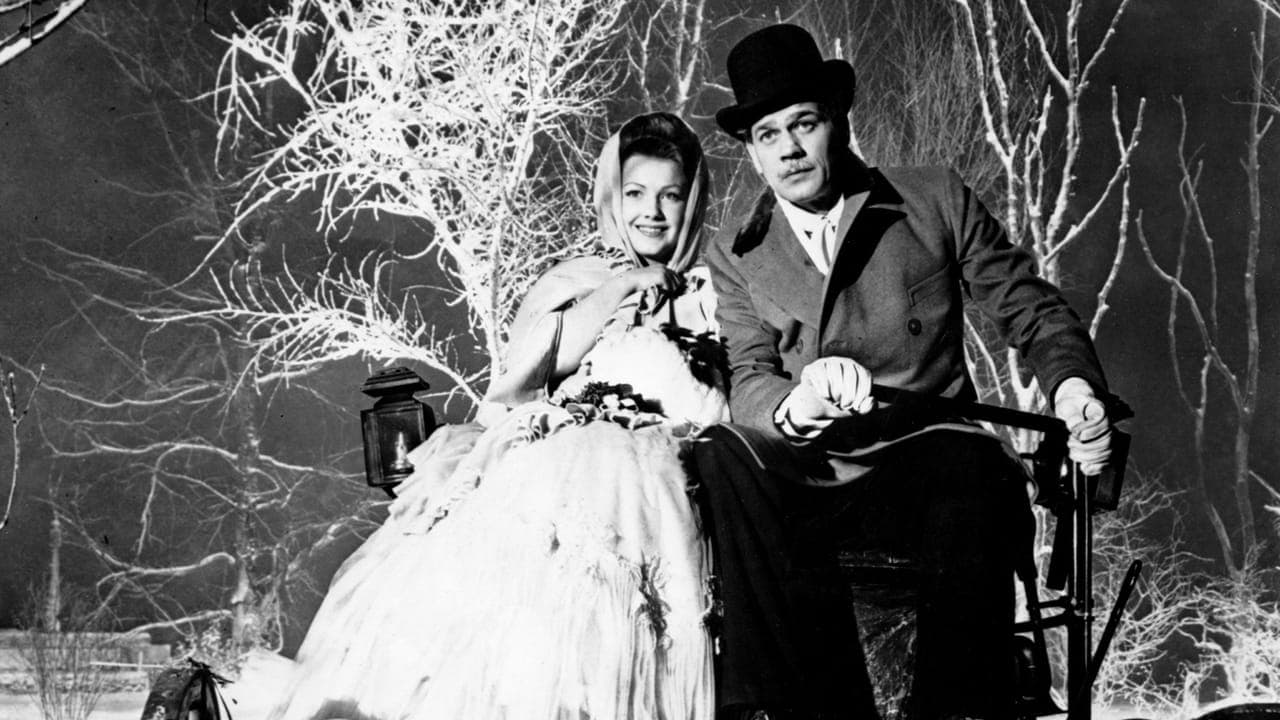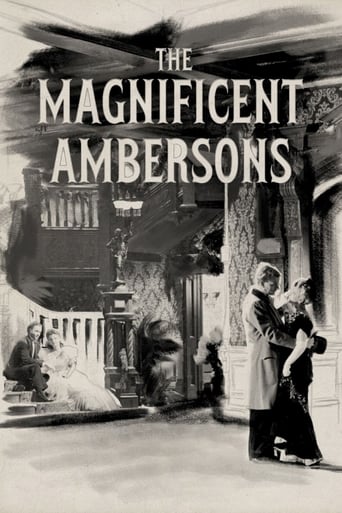ManiakJiggy
This is How Movies Should Be Made
Pluskylang
Great Film overall
Fairaher
The film makes a home in your brain and the only cure is to see it again.
Cristal
The movie really just wants to entertain people.
jc-osms
I haven't read the Booth Tarkington novel on which Orson Welles' film is based but I mean to, if only to try to fill in some of the gaps that the 50 minutes of studio cuts made to the 90 minute running time. Welles once said something like, watch it for the first hour, that part he recognised, but after that, it wasn't his film. There are several Hollywood movies where the production suits upstairs have cut down the running length of a film, but I can't think of another where I'd so much want to see what was lost.It's just so obvious watching it that the story of this film had more to give and should have been allowed to play out like say "Citizen Kane" had. Welles, apart from narrating the piece, stays firmly behind the camera and if anything his direction is even better this time. So much originality and imagination right from the start as Joseph Cotten's ardent young Eugene almost falls out the frame in the opening minute, the long dolly shot as George walks Lucy around the Amberson mansion at the grand ball, the shadow of Eugene's head on a door to signify death within, the changing light on the dying Isabel's face as the curtains are drawn in her room, the upward tracking shot up two flights of stairs to gauge George and Aunt Fanny's reactions after George has sent Eugene away, itself so reminiscent of the famous reaction shot of the stage workers in "Kane" to Susan's disastrous operatic debut, all these and many more.Of course there are other recognisable Wellesian trademarks, like the monumental sets, overlapping dialogue, long takes and extreme close-ups not to mention his entirely novel way with title sequences.Up until the part where you can see the scissors wielded, the story of mummy's boy George's unhealthily protective love for his mother and hers for him, for him justifying his extreme petulance and selfishness as an adult to the exclusion of her future happiness and indeed his own, makes for engrossing viewing. His actions sabotage two budding romances, one of which his own, with the only thing I couldn't fathom in all of the characters' various motivations being Lucy's continuing love for such a shallow, venal character.The film is thus set up for its tragic final acts but then the hacking really begins with George suddenly penniless, Uncle Frank leaves town, Fanny has squandered her life savings on an out-of-nowhere speculative investment and George quits his budding law career for a more dangerous, highly paid occupation to allow Fanny to live out her days sedately in a nursing home rather than spiral down to the nervous breakdown she seems to always be on the verge of. Then somehow she's all recovered and smiling on the arm of by now automobile-tycoon Eugene's arm as he reconciles himself to an ailing George, ironically a car accident victim. It's as if the second half of the film has been accelerated to double-speed and in an unsubtle, unsympathetic way at that.Back to the good things, the acting is exemplary from Welles' Mercury players, as is the superb photography but with the missing footage now long lost, one can only wonder at what might have been. As it is, there's more than enough directorial genius on view to still justify watching it but as for that second half, talk about your cultural vandalism.
Prismark10
Orson Welles thought his version of The Magnificent Ambersons could had eclipsed Citizen Kane. What we have is a condensed film edited by RKO pictures who got rid off the negatives.The film has an interesting opening by Joseph Cotten which is also the engine of this film, change through the years and how it affects one small town. Cotten's Eugene Morgan becomes wealthy over time because of the automobile.The wealthy Ambersons become poorer due to bad investments, spoilt George Minafer (Tim Holt) behaves badly to those around him thinking his family inheritance will always be there.However despite gaining wealth Eugene Morgan never manages to spark his relationship with George's mother the widowed Isabel Amberson mainly due to George sabotaging the relationship.Welles as director is still experimenting with the art of film, the way scenes are shots, even the closing credits are narrated. The film is rather pacy due to the interference by the film studio.
chaswe-28402
What's the date of this story ? Does it cover at least about 20 or 25 years ? Obviously post-dates Victoria most of the time but evidently pre-dates WWI. It feels like it, but then it's meant to be. Heavily dated, I mean.Reading Tim Holt's biography, it seems like his Minafer role was an odd one for him, since he apparently used to play cowboys. His character was so oedipal, unpleasantly rude and offensive it made the entire film intensely difficult to like in any way at all. The other characters were not exactly appealing either, since they provided no opposition. Wimps, in fact. Perhaps that's what was wrong with the whole set-up: no good guys. Feeble men, weepy females.The acting was good in spots, and some of the photography was quite creative, in a Wellesian sort of way. But if you haven't seen this I don't think you've missed much. Is the book read at all these days ? Tarkington's world is lost, they say. Succumbed to the automobile, the agent of Master Minafer's comeuppance.
JoeKulik
I'm glad that I didn't read any reviews for Orson Welles' The Magnificent Ambersons (1942) before I viewed it because they all mention that about an hour of the original film was burned by the studio editors while Welles was away on another project. Not knowing this historical tidbit about the film allowed me to appreciate it on its own merits without second guessing where the "missing" segments of the film were placed. In any case, I must say that the only negative thing about this film in regard to the "chop job" by RKO Studios is that the ending of the film, starting with the death of Isabel, did seem rather rushed and abrupt to me, even before I learned of RKO's "chop job". We go from Isabel's death to scant mentions of the Amberson fortune being lost (without ever knowing what happened to all the money), to George having to take a production job in an explosives factory, to George being hit by a car, and, finally to Mr Morgan visiting George in the hospital at the very end. This is the part, and the only part, of the film where I can say that the "chop job" probably diminished the quality of the film.Given the current state of The Magnificent Ambersons, however, I still feel that it is an excellent film. I've only viewed a few of Welles' films so far, and they all reveal his ability to "spin a good yarn". There is no "hidden meaning", or esoteric "symbolism" in this film. What you see is what you get, very much as was the case with Citizen Kane and The Stranger.But what you do get with this film is a damn good story, a very interesting, engaging and compelling story, with a solid script with no unreal "coincidences" or unexplainable "plot holes". As in the other Welles' films that I've seen, the performances by the whole cast, from the major to the minor characters, is very solid and definitely benefited from the wise directorship of Welles. The cinematography was great with lots of innovative camera positions and angles. The period sets and period costumes were much more than simply good.I would really like to see this film again very much because I enjoyed it so much the first time around. Just a very entertaining film with no gimmicks or gadgets, just delightful dramatic cinema at its best.

